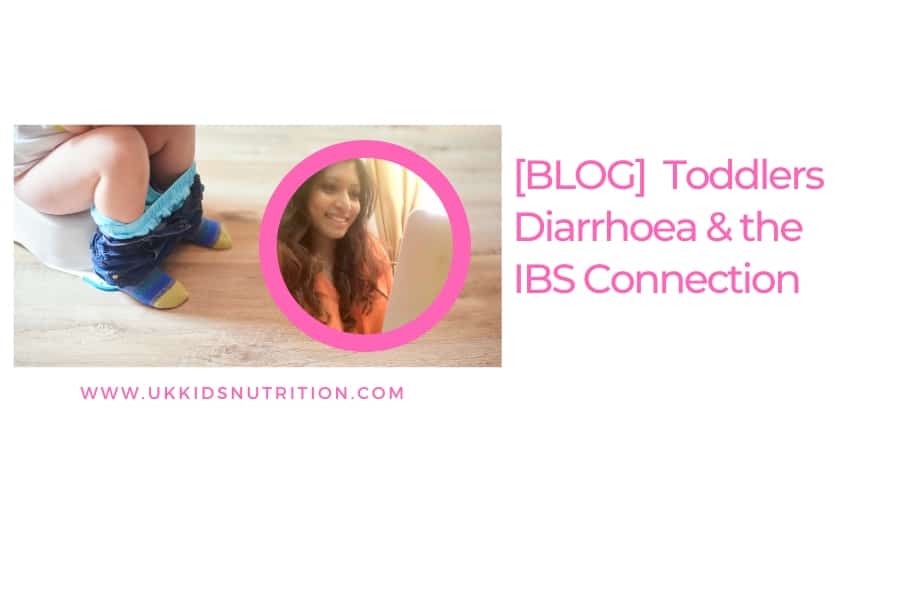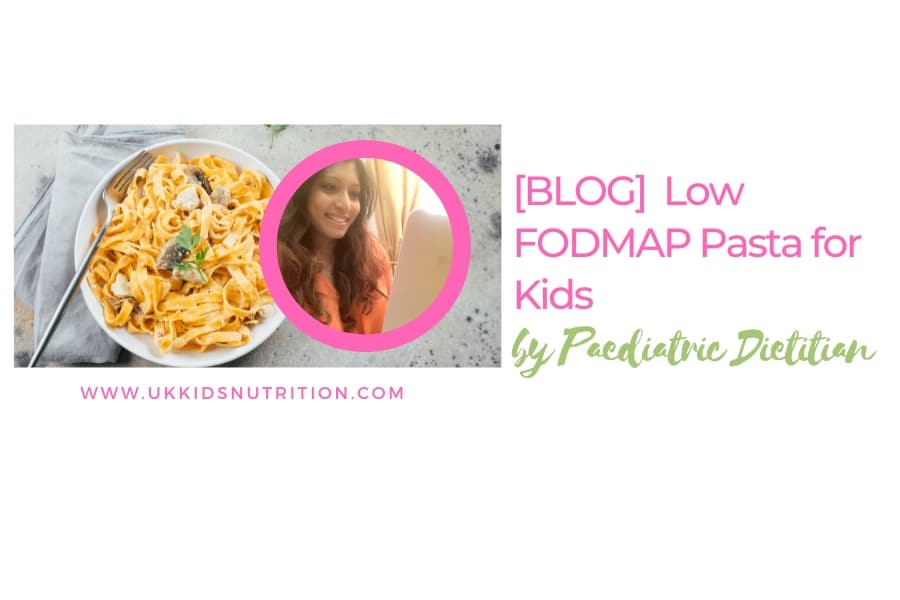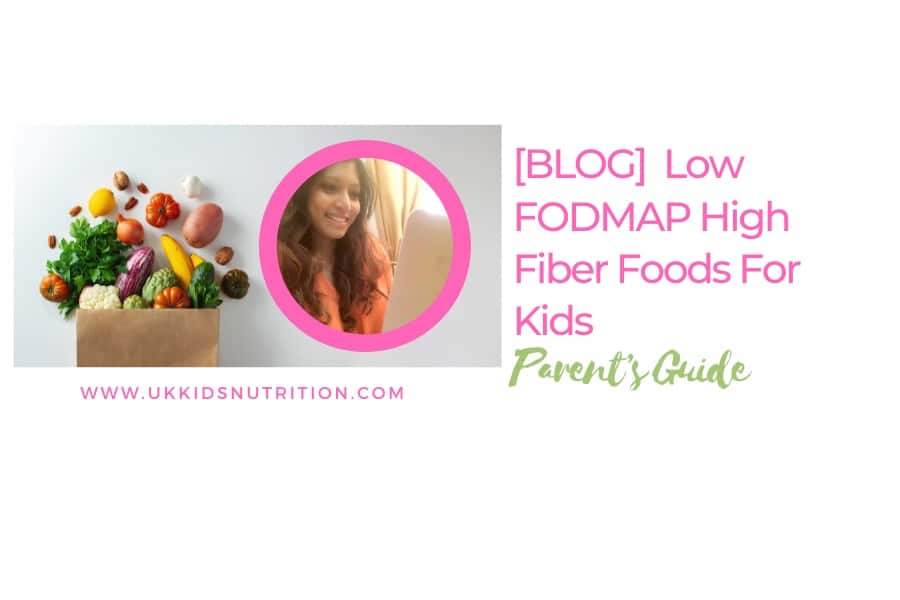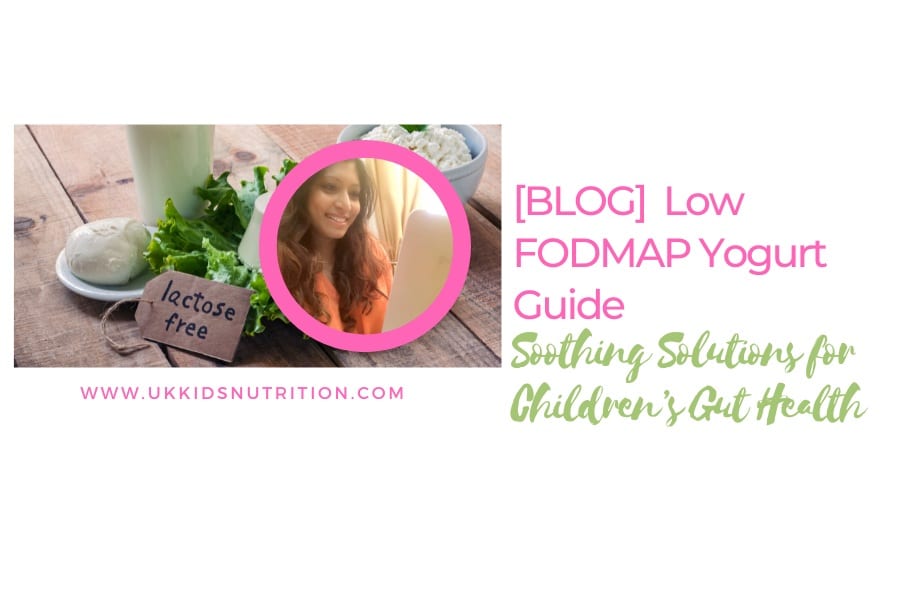Navigating the complex world of toddler health can be daunting for parents, especially when it comes to common concerns like toddler diarrhoea.
This comprehensive guide delves into the nuances of toddler diarrhoea, and its potential connection with Irritable Bowel Syndrome (IBS), and offers strategies for managing and monitoring your child’s digestive health.
What Is Toddler Diarrhoea?
Toddler diarrhoea, common among children under four, is characterised by loose and frequent bowel movements.
Despite these symptoms, children with toddler diarrhoea usually remain well.
They continue to grow normally and maintain a healthy appetite.
They may of course experience discomfort, irritability, and nappy rash due to frequent bowel movements.
Understanding Toddler Diarrhoea
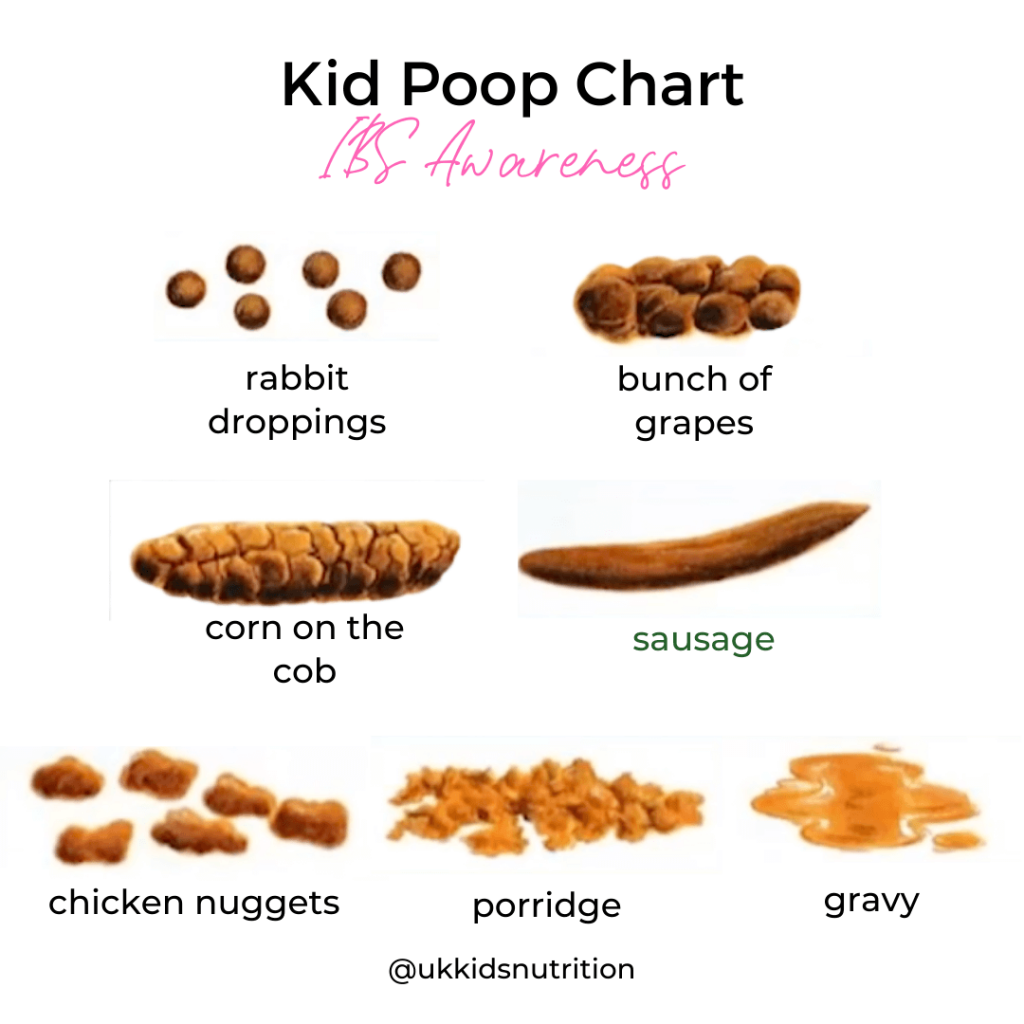
As a parent, deciphering the consistency and characteristics of your child’s stools is a valuable skill in understanding their tummy troubles.
Stools falling within grades 5-7 typically indicate loose to watery stools, a common hallmark of toddler’s diarrhoea.
Normal stools in children are typically sausage-shaped, soft, and easy to pass, earning them a grade 5 on the scale. Occasionally,
in cases of toddler’s diarrhoea, you might notice intermittent shifts in stool consistency, including bouts of diarrhoea interspersed with days of harder stools, often graded between 1 to 3 on the Bristol stool scale.
Understanding these variations in stool grading is a crucial step in monitoring your child’s digestive well-being.
It can provide valuable insights into their symptoms, triggers, and potential connections to conditions like Irritable Bowel Syndrome.
By keeping a close eye on their stool patterns, you can take proactive steps to support your child’s digestive health effectively.
In the Happy Belly Club, you’ll have access to the right tools and monitoring forms to assist you in this endeavour.
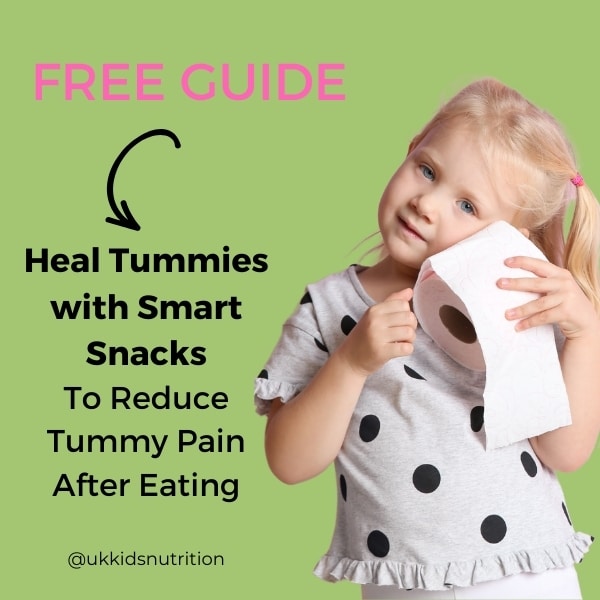
What Are the Symptoms of Toddlers Diarrhoea?
If your toddler, under the age of four years, is experiencing daily watery stools—sometimes even up to three a day—it’s not uncommon.
You might notice bits of undigested food like sweetcorn, carrots, or tomatoes in their stools.
The good news is that despite these symptoms, children usually remain clinically well, grow along their expected growth trajectory, and maintain healthy appetites.
However, witnessing your child frequently dealing with chronic nonspecific diarrhoea can be distressing as a parent.
It may lead to:
- Uncomfortable nappy rash
- Tummy discomfort
- Difficulty with potty training
- Irritability and mood changes
- Reduced appetite during mealtimes, which could lead to poor weight gain
- Time away from nursery or school
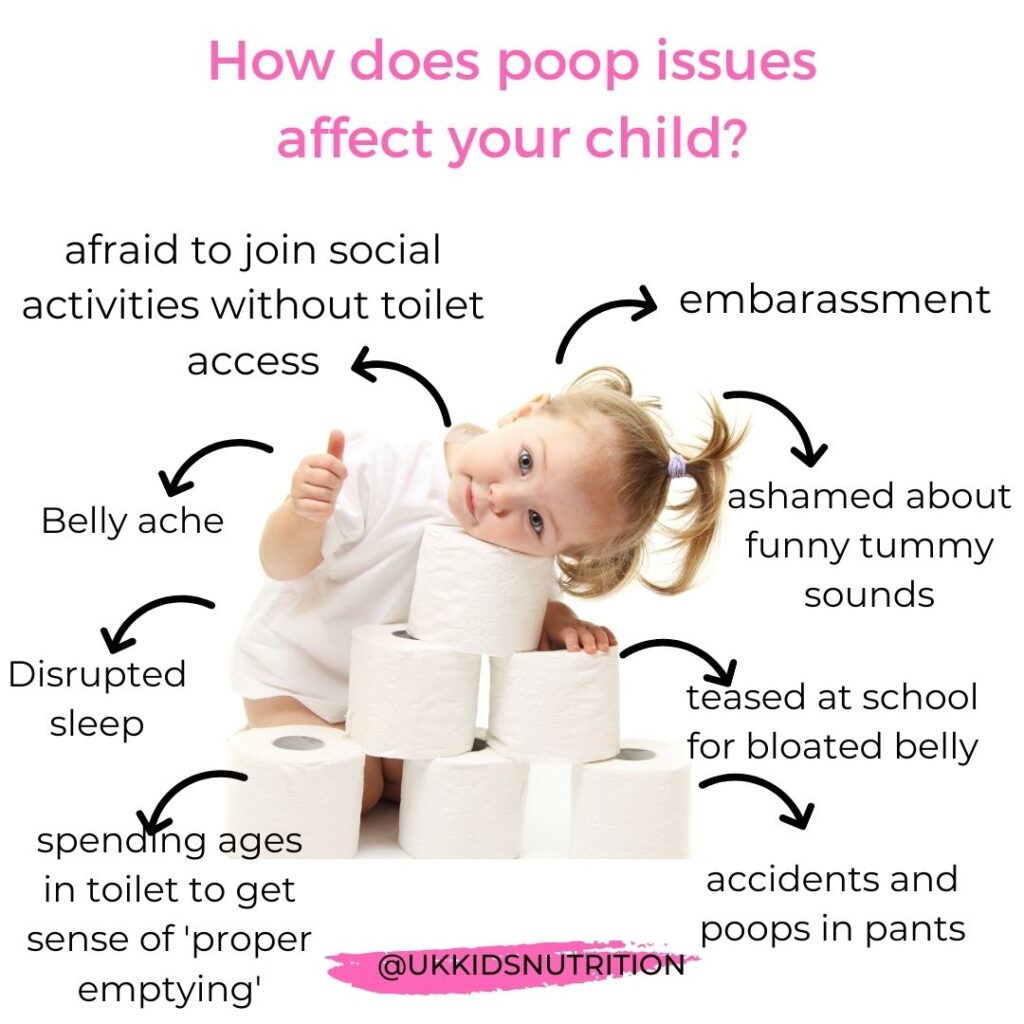
What Causes Toddler Diarrhoea?
Understanding the root causes of toddler diarrhoea is crucial for effective management and treatment.
While the exact cause can vary from child to child, here are some typical reasons for this condition:
- Gastrointestinal Infections: Viral gastroenteritis and other viral illnesses are common causes of acute diarrhoea in toddlers.
- Food Poisoning & Gastroenteritis: Consuming contaminated food can lead to food poisoning or viral gastroenteritis and acute diarrhoea. This is especially concerning in younger children and breastfed babies, who are more vulnerable to dehydration.
- Food Allergies: Allergies to specific foods, such as cow’s milk protein can result in diarrhoea.
- Lactose Intolerance: Some toddlers may develop diarrhoea due to lactose intolerance, where the body struggles to digest lactose in milk products. This can lead to symptoms like loose stools and abdominal pain.
- Inflammatory Bowel Disease: Though less common in toddlers, inflammatory bowel diseases like Crohn’s disease and ulcerative colitis involve chronic inflammation of the digestive tract.
- Coeliac Disease: An autoimmune response to gluten, found in wheat and other grains, can cause diarrhoea in affected children.
- Diet and Fluid Intake: The role of diet, particularly the consumption of fruit juices, can’t be overstated. Excessive fruit juice intake can lead to watery stools and contribute to the frequency of bowel movements.
- Irritable Bowel Syndrome: IBS can also be a contributing factor, especially if the child experiences recurrent and unexplained bouts of diarrhoea.
When to Seek Medical Attention
If your child has persistent diarrhoea or you notice blood in their stools, this must be reviewed by a medical doctor to rule out some of the more serious medical reasons for toddler diarrhoea.
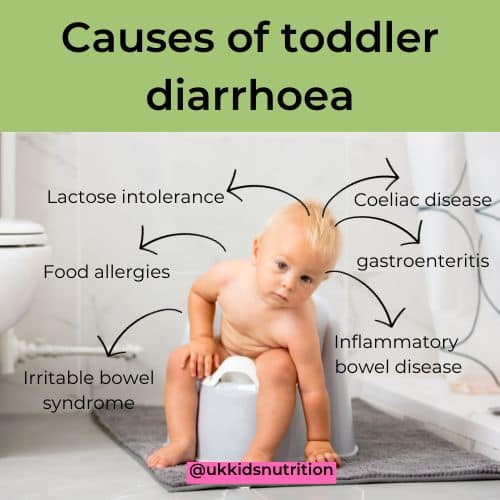
The Connection Between Toddler Diarrhoea and IBS
While IBS is more commonly thought of in older children, adolescents or adults, it can affect toddlers too.
IBS diarrhoea can present with symptoms similar to toddler diarrhoea.
Parents and healthcare providers need to distinguish between these conditions for appropriate management.
IBS Symptoms in Toddlers
Let’s take a closer look at the specific symptoms that may manifest in toddlers with IBS.
Keep in mind that IBS can exhibit differently in young children compared to adults, making it essential to recognise the signs tailored to their age group:
Abdominal Pain: Toddlers with IBS may experience recurrent abdominal pain. This discomfort is typically located in the central or lower abdominal region and often improves after a bowel movement.
Bloating: Bloating is another symptom that may affect toddlers with IBS. It can occur with or without visible distension of the abdomen, contributing to their discomfort.
Excessive Gas: Excessive gas or wind can be a common occurrence in toddlers with IBS. This can lead to additional discomfort and tummy troubles.
Diarrhoea with Urgency: Diarrhoea in IBS toddlers is often accompanied by a sense of urgency. This means that they may need to go quickly, which can sometimes lead to nappy rash.
Constipation and Soiling: On the flip side, some toddlers with IBS may experience constipation. This can be particularly challenging as it may be accompanied by soiling or a feeling of incomplete bowel emptying.
By understanding these specific symptoms in the context of toddlers, you can better identify potential signs of IBS in your child.
However, it’s crucial to remember that a medical professional should be consulted to confirm any suspicions and rule out other conditions.
Prevention Strategies
While it’s not always possible to completely prevent toddler diarrhoea or its connection to IBS, there are several steps parents can take to reduce the risk and manage symptoms effectively.
Maintaining a well-balanced diet, rich in fibre and low in trigger foods, can be a cornerstone of prevention.
Encouraging regular handwashing and hygiene practices can also help prevent gastrointestinal infections that might contribute to diarrhoea.
Additionally, creating a calm and stress-free environment for your child can go a long way in managing IBS-related symptoms, as stress can exacerbate toddler diarrhoea.
Importance of Hydration and Diet
Dehydration remains a significant concern in toddlers with chronic diarrhoea.
Ensuring adequate water intake and monitoring foods that might exacerbate symptoms are key steps.
Parents should be aware that older children might express symptoms differently than younger toddlers or breastfed babies.
Seeking Professional Health Information
Consulting a doctor for accurate health information is critical, especially when symptoms persist.
Whether it’s understanding the nuances of bowel syndrome, or bowel disease, or evaluating dietary choices, professional guidance ensures that children receive the care they need.
When to Worry and Specific Symptoms
- Toddler Diarrhoea When to Worry: Parents need to recognize signs that require immediate medical attention, such as persistent foul-smelling yellow diarrhoea in toddlers, which might indicate a more serious underlying condition.
- Weight loss: While diarrhoea is often benign, certain symptoms like significant weight loss, chronic stomach pain, and persistent loose stools warrant immediate medical attention.
- Toddler Diarrhoea No Other Symptoms: In some cases, children may experience diarrhoea without additional symptoms. Continuous monitoring and a medical review are advised in these situations.
Home Management and NHS Guidelines
- How to Treat Diarrhoea in Toddlers: Following NHS guidelines and home remedies, like ensuring adequate hydration and a balanced diet, can be effective in managing mild diarrhoea cases at home.
- Home Remedies for Diarrhoea in Toddlers: Simple remedies include providing oral rehydration solutions and avoiding high-sugar or high-fibre foods until symptoms improve.
Addressing Acute Symptoms
- How to Stop Diarrhea in Kids Fast: Quick relief often involves ensuring proper hydration. If symptoms persist, consult a healthcare professional for potential medication.
- Vomiting and Diarrhoea in Toddlers: These symptoms, particularly when occurring together, significantly increase the risk of dehydration. Medical attention is necessary to ensure proper treatment.
Treating Diarrhoea in Toddlers
- Treating Diarrhoea in Toddlers: Strategies should focus on the underlying cause, whether dietary, infectious, or a chronic condition like IBS.
- Sickness and Diarrhoea in Toddlers: Monitoring for dehydration and seeking medical advice if symptoms worsen is crucial when diarrhoea is accompanied by sickness.
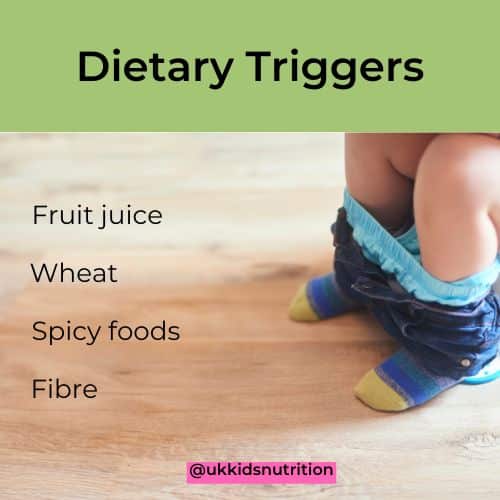
Nutritional Management of Toddler Diarrhoea
Dietary Triggers and Restrictions
Now, let’s talk about what’s on your toddler’s plate and how it might be contributing to those frequent bouts of diarrhoea.
It’s crucial to remember that every child is unique, and what triggers one might not trigger another.
However, there are some common dietary suspects to consider.
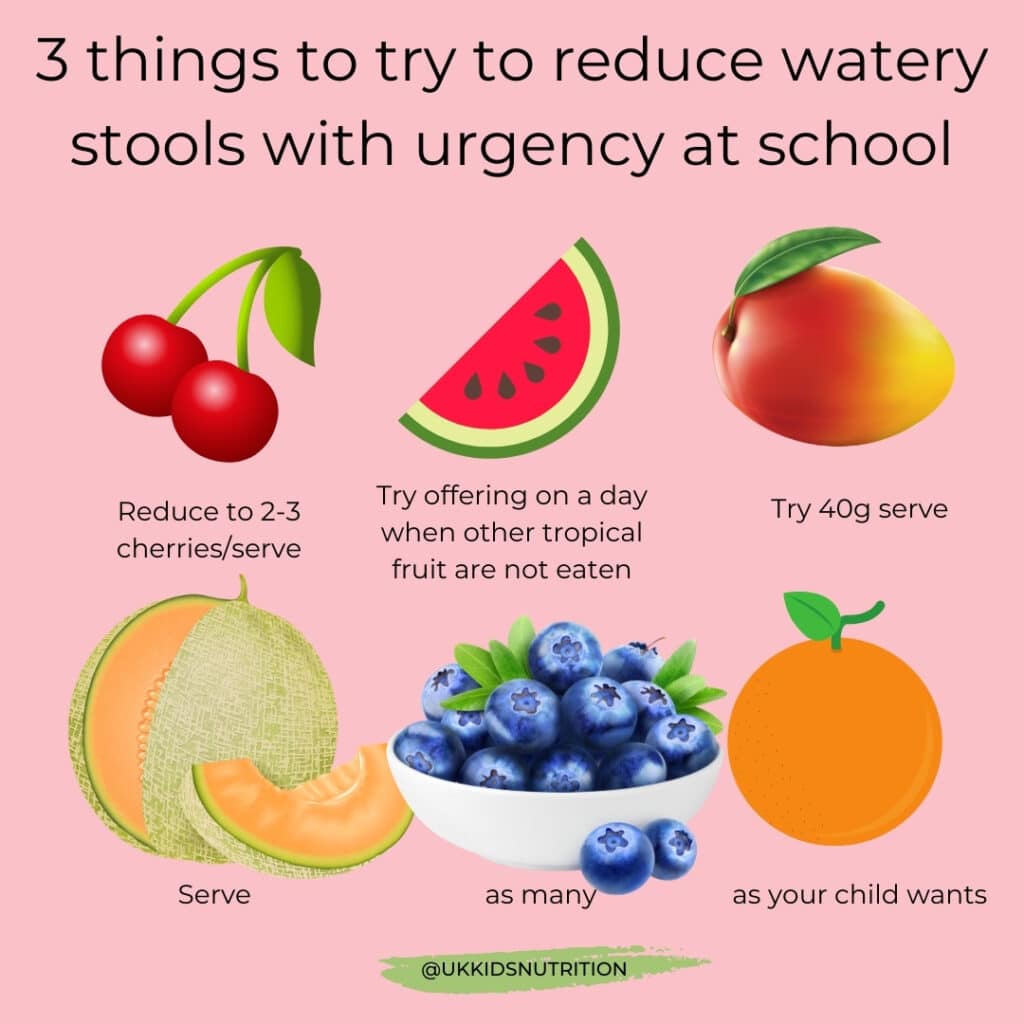
Toddler diarrhoea foods to avoid
Spicy Foods
Spicy foods can irritate the sensitive digestive systems of toddlers, potentially worsening diarrhoea.
High Fibre Intake
While fibre is essential for digestive health, excessive fibre intake, especially insoluble fibre, can lead to loose stools. Monitor your child’s fibre intake to maintain a balanced diet.
Fruit Juice and Toddler Diarrhoea
Fruit juices, particularly those high in fructose, can be a contributing factor to diarrhoea in toddlers when consumed in excess.
While fruit juice provides essential vitamins and nutrients, it can also lead to digestive issues due to its high fructose content.
In large quantities, fructose can ferment in the gut, causing bloating, gas, and loose stools.
To manage this, it’s important to find the right balance in your toddler’s juice intake.
Diluting fruit juices and offering them in moderation is a practical approach.
Opting for whole fruits whenever possible is beneficial as they provide fibre and nutrients without the concentrated sugar found in juices.
Remember, each child’s tolerance to fruit juices can vary.
If your toddler is frequently consuming fruit juice, consider cutting back and encouraging them to drink enough fluids, particularly water, to stay hydrated.
See NHS guidelines for diluting fruit juice for children.
Making strategic adjustments in your child’s diet can significantly help in alleviating diarrhoea symptoms.
However, it’s crucial to consult with your paediatrician or paediatric dietitian before making significant dietary changes.
Read: 7 Ways To Get Your Toddler To Drink Water
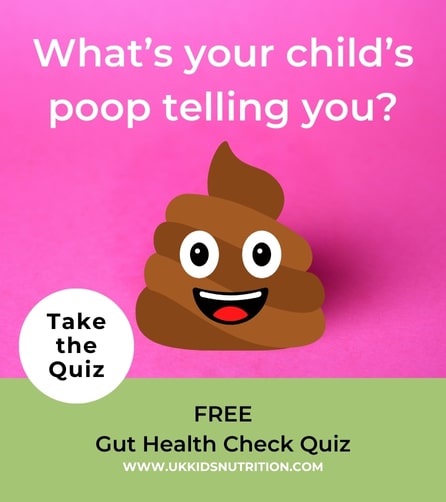
Gluten
Now, let’s tackle a common dietary suspect that often gets the blame for toddler diarrhoea: gluten.
Many parents worry that gluten-rich foods may be the root cause of their child’s digestive woes, but the truth is a bit more nuanced.
Gluten Tolerance
First things first, most children can digest gluten-rich foods without any issues.
Gluten is a protein found in grains like wheat, barley, and rye, and it’s a staple in many diets worldwide.
So, if your toddler loves their bread, pasta, and baked treats, there’s usually no need to hit the panic button.
Fructans in Wheat
However, there’s a twist in the gluten story, especially for some children with IBS.
It’s not the gluten itself that’s the problem but rather a carbohydrate called fructans found in wheat.
In these cases, a high intake of fructans can contribute to loose stools and tummy troubles.
Toddlers are known for their hearty appetites, and it’s not uncommon for them to enjoy plenty of wheat-based foods like bread, pasta, and baked goods.
These foods are essential for their growing bodies, providing carbohydrates needed for normal growth and development.
If you suspect that wheat might be playing a role in your child’s diarrhoea, you don’t need to banish bread from their diet.
Sometimes, a simple switch from regular bread to an alternative can make a significant difference.
Read: Does bread cause bloating?
For some children, switching from white to wholemeal bread can do wonders too!
It’s a small adjustment that could have a big impact on your toddler’s comfort.
FODMAPs
FODMAPs, or Fermentable Oligosaccharides, Disaccharides, Monosaccharides, and Polyols, are a group of carbohydrates that can play a significant role in triggering changes in stool patterns, particularly in children with Irritable Bowel Syndrome (IBS).
It may sound complex due to their acronym, but their impact on the digestive tract can be straightforward to address with the right guidance.
In the Happy Belly Club, following the ROME Foundation's diagnostic criteria, if a child has been identified as having IBS, you’ll be shown whether FODMAPs are contributing to your child's toddler diarrhoea.
My approach involves a step-by-step process to determine which specific FODMAPs might be responsible for your child's symptoms.
By narrowing down the culprits, we can tailor dietary recommendations to alleviate your child's discomfort and promote a healthier digestive life.
As parents, it's our goal to empower you with the knowledge and tools needed to support your child's digestive gut health.
By addressing dietary triggers like FODMAPs, we can take a significant step towards improving your child's comfort and overall quality of life.
Keep in mind that addressing fermentable carbohydrates and their impact on your child's IBS should be done in consultation with a paediatric dietitian.
Check that your paediatric dietitian is appropriately trained to support tummy troubles like IBS (see Monash directory).
Their expertise will ensure that any dietary modifications are safe and suitable for your child's specific needs.
However, FODMAPs are just one piece of the puzzle, and by understanding these nuances, you're better equipped to make informed decisions about your child's nutritional needs.
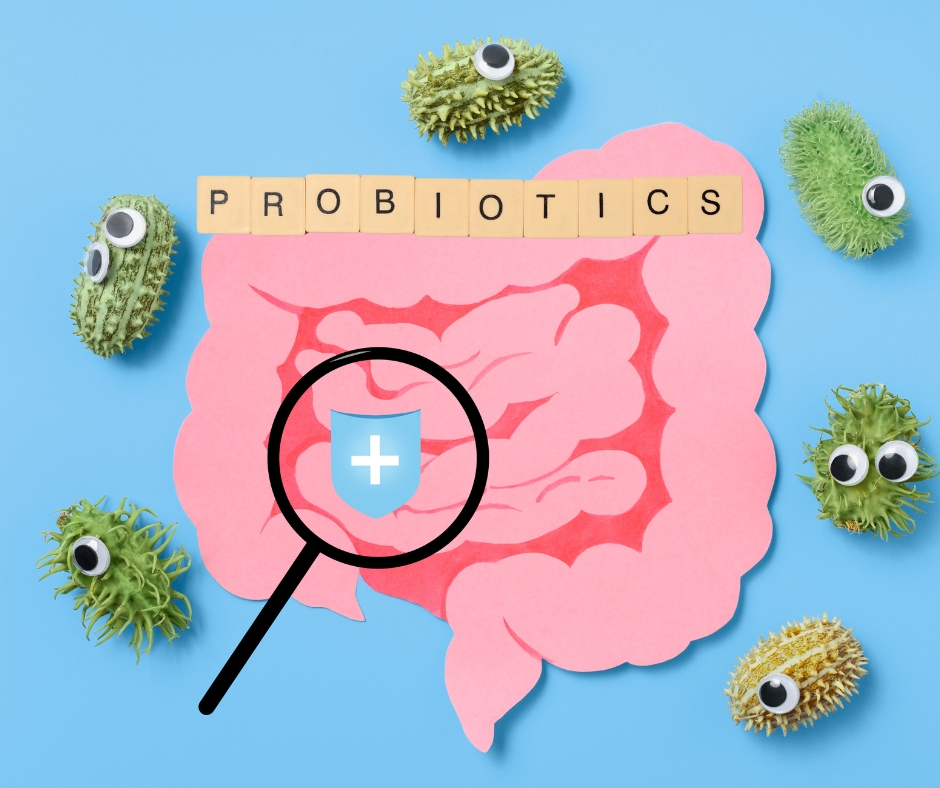
Medications and Supplements
Antibiotics
Antibiotics are powerful medicines designed to combat infections.
However, they come with a double-edged sword effect.
While they target harmful bacteria causing illnesses, they can also inadvertently kill the beneficial gut bacteria, which play a crucial role in digestion and overall gut health.
When the delicate balance of gut bacteria is disrupted by antibiotics, it can lead to a bout of diarrhoea.
This is often referred to as antibiotic-related diarrhoea.
It's a short-term side effect that can be uncomfortable for your child.
Probiotics
Fortunately, there's a solution that can help alleviate these temporary symptoms: probiotics.
Probiotics are beneficial live bacteria and yeasts that can support your child's gut health, particularly during antibiotic treatment.
When considering probiotics for your child, it's crucial to opt for ones that are proven to help relieve the symptoms of antibiotic-related diarrhoea.
There's a wide array of probiotic supplements available, including those specifically formulated for kids.
These probiotics can help restore the balance of good bacteria in your child's gut and mitigate the digestive disruptions caused by antibiotics.
If you're looking for guidance on the best probiotics for kids, be sure to check out our comprehensive guide on the 12 Best Probiotics For Kids.
It provides insights into probiotic options that are safe and effective for children.
Incorporating probiotics into your child's routine during antibiotic treatment can make a significant difference in their comfort and antibiotic-related diarrhoea.
Bottomline
In the world of parenting, tackling toddler diarrhoea can be a challenging journey. Still, it's essential to remember that you're not alone, and there is a path to providing your little one with the care and support they need.
By gaining a deeper understanding of toddler diarrhoea, its potential connection to Irritable Bowel Syndrome (IBS), and the various factors that come into play, you're better equipped to navigate these waters.
Remember, every child is unique, and what works for one may not work for another.
Seek guidance from medical professionals and IBS-trained paediatric dietitians, and explore tailored solutions to restore your toddler's gut.
Through diligence, patience, and the right resources, you can help your child embark on a healthier, more comfortable digestive journey.

Let Me Help
If you’re seeking more personalised guidance or in-depth information, consider exploring my specialized programs and resources:
- Online Course: “Happy Belly Blueprint” – This comprehensive course offers detailed strategies and insights to alleviate constipation and related discomfort in children.
- 1-2-1 Programme: “IBS Kids Mastery Method” – Tailored for individual needs, this program provides one-on-one support to master the challenges of IBS in kids.
- FREE Guide: Don’t miss out on the valuable insights in “Heal Tummies With Smart Snacks.” Download this free guide to start making positive changes today.
- CHAT With Bahee: Book a free initial consultation to discuss the Happy Belly Club.
Each of these resources is designed to empower you with the knowledge you need to support your child's gut health.
